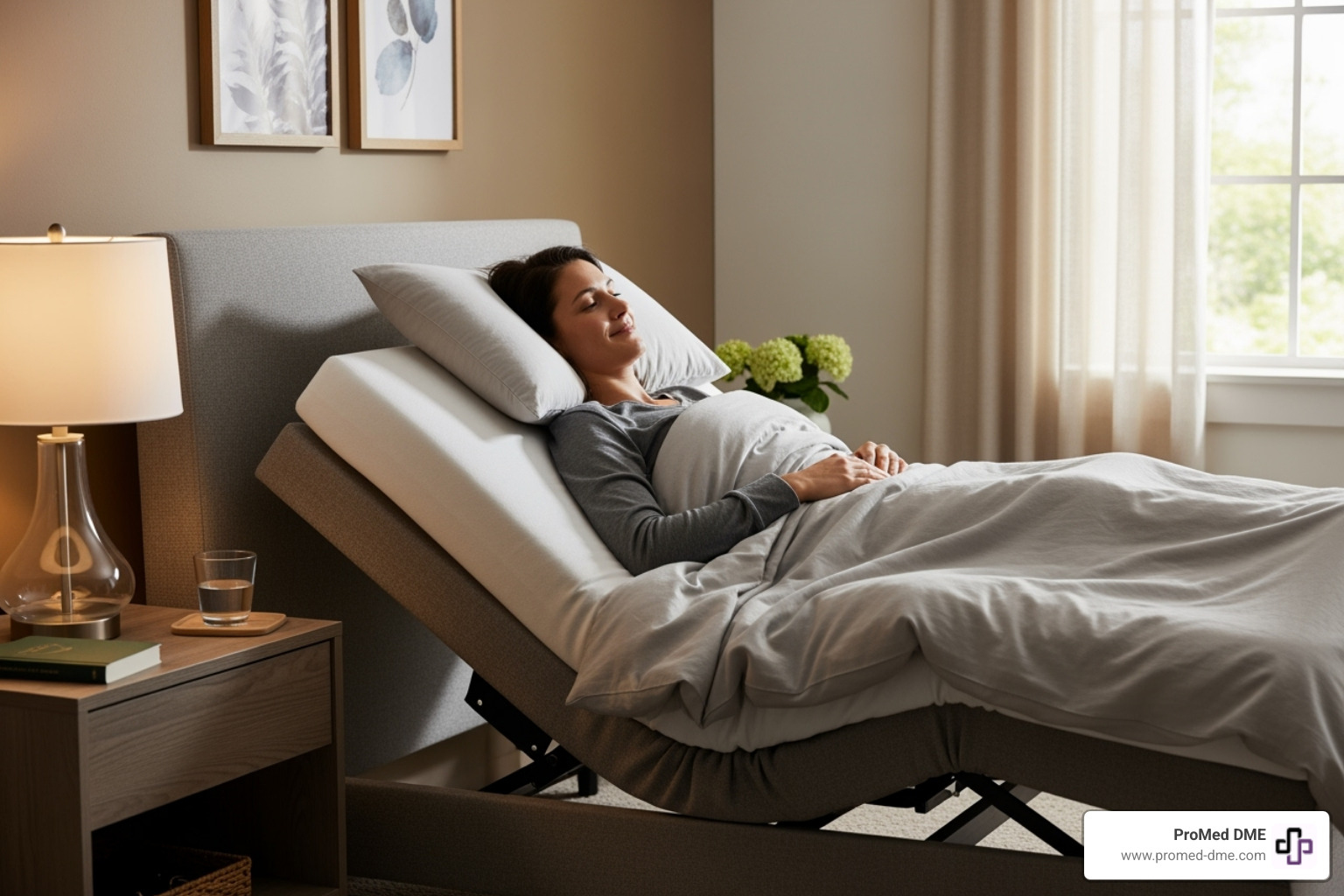Navigating the World of DME: A Supplier's Guide

The Importance of Durable Medical Equipment (DME)
Navigating Durable Medical Equipment (DME) is essential for anyone managing chronic health conditions or requiring long-term medical support. DME refers to equipment and supplies prescribed by a healthcare provider for everyday or extended use, such as wheelchairs, oxygen equipment, and blood testing strips for diabetics.
Quick Overview of DME:
- Definition: Equipment prescribed for long-term use.
- Examples: Wheelchairs, oxygen equipment, crutches, blood testing strips.
- Purpose: To provide daily support and improve quality of life for those with chronic health conditions.
- Coverage: Often covered by Medicare and insurance plans; specifics vary.
In healthcare, DME stands out for its role in enhancing the quality of life for patients with chronic conditions like diabetes or mobility issues. It can range from something as common as a wheelchair to more complex equipment like portable oxygen devices.
Why DME Matters:
- Improves Mobility: Devices such as walkers and scooters aid in daily movement.
- Promotes Independence: Equipment like blood sugar meters help in managing health independently.
- Ensures Safety: Items like hospital beds and lift chairs provide a safe environment for patients at home.

Understanding Durable Medical Equipment (DME)
Durable Medical Equipment (DME) is essential for managing health conditions at home. It helps improve quality of life by providing support for various medical needs. Let's break down what DME is and look at some common examples.
What is DME?
Durable Medical Equipment is defined by a few key criteria:
- Durable: The equipment must withstand repeated use. It's built to last, not disposable.
- Medical Reason: It serves a medical purpose and is typically only useful for someone who is sick or injured.
- Home Use: The equipment is intended for use at home, not in hospitals or nursing homes.
- Longevity: It is expected to last at least three years.
Common Types of DME
Here are some examples of DME that are commonly covered by Medicare and other insurance plans:
Oxygen Equipment
Oxygen equipment is vital for individuals with respiratory issues. It helps ensure that you get the oxygen you need, whether you have conditions like COPD or sleep apnea. Medicare covers various types of oxygen equipment, including portable oxygen concentrators.
Wheelchairs
Wheelchairs provide mobility for those who have difficulty walking. They are built to be durable and are often covered by insurance if prescribed by a doctor. Both manual and electric wheelchairs fall under this category.
Crutches
Crutches are essential for those recovering from leg injuries or surgeries. They help you move around safely and reduce the risk of further injury. Medicare covers crutches when they are medically necessary.
Blood Testing Strips

For diabetics, blood sugar meters and test strips are crucial. These devices allow you to monitor your glucose levels regularly, which is vital for managing diabetes. Medicare Part B covers these items, ensuring that you have the tools you need to stay healthy.
Understanding these basics can help you steer DME and make informed decisions about your healthcare needs.
Next, we’ll dig into how Medicare covers DME and what you need to know about costs and payment options.
Medicare and DME Coverage
What Does Medicare Cover?
Medicare Part B covers a wide range of durable medical equipment (DME) if it meets certain criteria. To be eligible for coverage, the equipment must:
- Be durable and withstand repeated use.
- Serve a medical purpose.
- Be used in your home.
- Have an expected lifespan of at least three years.
Common types of DME that Medicare covers include:
- Blood Sugar Meters: Essential for diabetics to monitor glucose levels. Medicare Part B covers these devices along with test strips.
- CPAP Machines: Used for sleep apnea, these machines help you breathe easier while sleeping.
- Hospital Beds: If you need a hospital bed at home due to a medical condition, Medicare can cover the cost.
- Nebulizers: These devices are critical for those with respiratory conditions like asthma or COPD, turning medication into a mist for easier inhalation.
Costs and Payment Options
While Medicare Part B covers a significant portion of DME costs, it does not cover everything. Here’s what you need to know about costs and payment options:
Rental vs. Purchase:
- Rental Payments: Medicare often covers the rental cost for items like hospital beds and oxygen equipment. You will still be responsible for 20% of the monthly rental fee.
Example: If the monthly rental fee for a hospital bed is $150, you will pay $30 (20% of $150) each month.
- Buying Equipment: For long-term needs, buying might be more cost-effective. After meeting your deductible, you will pay 20% of the Medicare-approved amount.
Example: If a wheelchair costs $500, you will pay $100 (20% of $500) upfront after meeting your deductible.
Out-of-Pocket Expenses:
- Coinsurance: You are generally responsible for 20% of the Medicare-approved amount for DME after paying your yearly deductible.
- Deductibles: You must meet your annual Part B deductible before Medicare starts covering the cost.
- Insurance Plans: Check your plan’s Summary of Benefits to understand what DME supplies are covered.
Understanding these cost structures can help you make informed decisions about whether to rent or buy your DME, potentially reducing your out-of-pocket expenses.
Next, we’ll explore how to choose the right DME supplier to ensure you get the best quality and service.
Choosing the Right DME Supplier
Choosing the right DME supplier is crucial for managing your health effectively. Here are some key factors to consider:
Key Factors to Consider
Quality of Products
Quality matters. Look for a supplier that offers durable, functional, and easy-to-use equipment. High-quality products ensure better health outcomes and fewer replacements.
Insurance Compatibility
Healthcare costs can add up quickly. Ensure your supplier accepts your insurance plan, including Medicare and Medicaid. This can significantly reduce your out-of-pocket expenses.
Customer Service
Exceptional customer service is essential. A good supplier should help you understand your insurance coverage, manage paperwork, and answer any questions about the products.
Product Range
A broad range of products is important. From wheelchairs to CPAP machines, having a variety of options ensures you get exactly what you need.
Delivery Options
Consider suppliers that offer prompt and discreet delivery to your doorstep. This is especially important if you have mobility issues or live far from a physical store.
ProMed DME: A Trusted Supplier
Top-Quality Products
At ProMed DME, we pride ourselves on offering a wide range of top-notch medical supplies. Our products are trusted by healthcare professionals, ensuring you get only the best for your health management.
Exceptional Customer Service
We go above and beyond in offering customer service. We have a dedicated nurse on staff, ready to help you steer the complex world of DME, answer your questions, and assist you in finding the best solutions for your medical supply needs.
We understand the financial strain of healthcare costs. That's why we accept most insurance plans, including Medicare, Medicaid, and commercial plans, aiming to make your DME needs as affordable as possible.
Free Shipping
We don’t just sell products; we deliver solutions right to your front door. We work closely with your healthcare team to gather your prescription and ensure your orders are delivered promptly and discreetly.
By considering these factors and choosing a trusted supplier like ProMed DME, you can ensure you receive high-quality products with excellent customer support, making your health management easier and more effective.
Next, let’s explore how to manage and maintain your DME to ensure it lasts and functions properly.
Managing and Maintaining Your DME
Proper management and maintenance of your durable medical equipment (DME) are crucial to ensure it works effectively and lasts as long as possible. Let's break down some essential practices.
Regular Maintenance Practices
Cleaning: Regular cleaning is vital. Follow the manufacturer's guidelines for cleaning each piece of equipment. For example, CPAP machines often require weekly cleaning of the mask and hose.
Inspection: Routinely check your equipment for any signs of wear or damage. Look for cracks, loose parts, or anything that seems out of place.
Troubleshooting: If your equipment isn't working as expected, consult the user manual for troubleshooting tips. Many issues can be resolved with simple fixes, like resetting the device or replacing a battery.
When to Repair or Replace
Signs of Wear: Over time, equipment can show signs of wear and tear. For instance, wheelchairs may have worn-out tires or loose screws. If you notice these issues, it may be time for repairs.
Manufacturer Guidelines: Always refer to the manufacturer's guidelines for maintenance schedules and replacement parts. These guidelines are designed to keep your equipment in optimal condition.
Insurance Policies: Check your insurance policy for coverage on repairs and replacements. Some policies cover routine maintenance, while others may only cover significant repairs or replacements.
First-Year Exclusion: Replacement parts or repairs within the first year are typically not covered. Providers must honor warranty repairs during this period.
Warranty Obligations: Ensure that any repairs or modifications are done under warranty obligations. Providers are required to honor these and cannot delay necessary repairs.
Cost Limits: Reimbursement for maintenance is usually capped at 75% of the original equipment cost plus any modifications.
By following these maintenance and repair guidelines, you can extend the life of your DME and ensure it continues to meet your needs effectively.
Next, let's address some frequently asked questions about DME to clear up any remaining doubts.
Frequently Asked Questions about DME
What is the Difference Between DME and Medical Supplies?
Durable Medical Equipment (DME) is designed for long-term use. These items are built to withstand repeated use and are expected to last at least three years. Examples include wheelchairs, hospital beds, and CPAP machines.
On the other hand, medical supplies are usually disposable and have a short lifespan. Items like bandages, gauze, and catheters fall into this category. They are used once or for a short period and then discarded.
Insurance Classification: Medicare Part B generally covers DME if it's medically necessary and prescribed by a doctor. However, coverage for medical supplies is more limited. For example, Medicare covers diabetic testing strips but not everyday items like bandages.
How to Get DME Covered by Insurance?
Doctor's Prescription: To get DME covered by insurance, you need a prescription from a Medicare-enrolled doctor. The equipment must be deemed medically necessary for use in your home.
Insurance Approval: Once you have a prescription, the next step is getting insurance approval. This involves submitting the prescription and any necessary documentation to your insurance provider.
Rental Agreements: Some DME items are available for purchase, while others are typically rented. Medicare often requires you to rent the equipment first. After a certain number of rental payments, the equipment may become your property.
What to Do if Your DME is Damaged in a Disaster?
Emergency Rules: In the event of a disaster or emergency, the usual rules for replacing lost or damaged DME may change. Medicare has specific guidelines for these situations, and it's important to stay informed.
Replacement Process: If your DME is damaged, contact your supplier immediately. They can guide you through the replacement process, which may involve submitting a claim to your insurance provider.
Insurance Claims: To file an insurance claim, you'll need to provide documentation of the damage and possibly a new prescription from your doctor. Your insurance provider will then review the claim and determine coverage.
By understanding these key differences and processes, you can steer DME more effectively and ensure you get the equipment you need.
Conclusion
Navigating durable medical equipment (DME) can be challenging, but choosing the right supplier makes all the difference. Selecting a trusted partner ensures you receive top-quality products, excellent customer service, and seamless insurance compatibility.
Choosing the right supplier is crucial. The right DME supplier will offer a wide range of products, from oxygen equipment to wheelchairs, and will work closely with your insurance provider to minimize out-of-pocket expenses. A reliable supplier will also provide exceptional customer support, helping you understand your options and assisting with any issues that arise.
At ProMed DME, we are committed to your health and independence. We offer:
- Top-quality products: Our extensive range of DME products caters to various health needs, ensuring you find exactly what you need.
- Exceptional customer service: Our team is here to guide you through every step, from selecting the right equipment to navigating insurance claims.
- Free, discreet shipping: We provide free, secure, and discreet shipping right to your front door, making your journey to better health as smooth as possible.
We believe everyone deserves access to the best healthcare supplies. Let's take the first step towards better health together. Reach out to us today and see why we are a top choice for many when it comes to DME suppliers.
Thank you for considering ProMed DME as your trusted partner in healthcare. Here's to a healthier and more independent future!
Related Resources & Articles
Stay informed with our informative blog posts.
Discover the ProMed Advantage
& Try Our Products
We offer free shipping and legendary customer service to ensure you receive the
best DME products for your needs.






